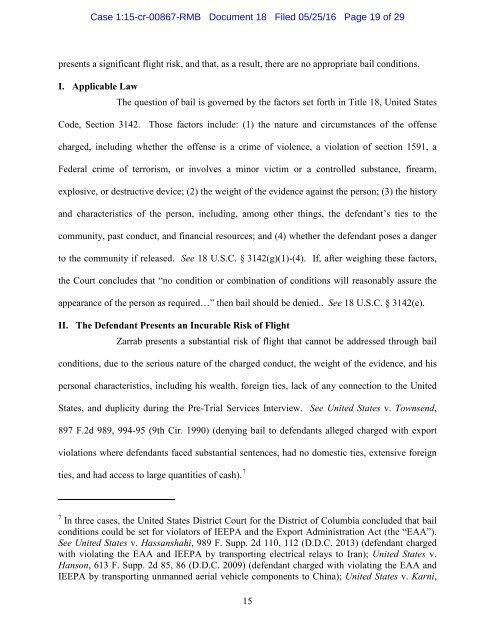Create successful ePaper yourself
Turn your PDF publications into a flip-book with our unique Google optimized e-Paper software.
Case 1:15-cr-00867-RMB Document 18 Filed 05/25/16 Page 19 of 29<br />
presents a significant flight risk, and that, as a result, there are no appropriate bail conditions.<br />
I. Applicable Law<br />
The question of bail is governed by the factors set forth in Title 18, United States<br />
Code, Section 3142. Those factors include: (1) the nature and circumstances of the offense<br />
charged, including whether the offense is a crime of violence, a violation of section 1591, a<br />
Federal crime of terrorism, or involves a minor victim or a controlled substance, firearm,<br />
explosive, or destructive device; (2) the weight of the evidence against the person; (3) the history<br />
and characteristics of the person, including, among other things, the defendant’s ties to the<br />
community, past conduct, and financial resources; and (4) whether the defendant poses a danger<br />
to the community if released. See 18 U.S.C. § 3142(g)(1)-(4). If, after weighing these factors,<br />
the Court concludes that “no condition or combination of conditions will reasonably assure the<br />
appearance of the person as required…” then bail should be denied.. See 18 U.S.C. § 3142(e).<br />
II. The Defendant Presents an Incurable Risk of Flight<br />
Zarrab presents a substantial risk of flight that cannot be addressed through bail<br />
conditions, due to the serious nature of the charged conduct, the weight of the evidence, and his<br />
personal characteristics, including his wealth, foreign ties, lack of any connection to the United<br />
States, and duplicity during the Pre-Trial Services Interview. See United States v. Townsend,<br />
897 F.2d 989, 994-95 (9th Cir. 1990) (denying bail to defendants alleged charged with export<br />
violations where defendants faced substantial sentences, had no domestic ties, extensive foreign<br />
ties, and had access to large quantities of cash). 7<br />
7 In three cases, the United States District Court for the District of Columbia concluded that bail<br />
conditions could be set for violators of IEEPA and the Export Administration Act (the “EAA”).<br />
See United States v. Hassanshahi, 989 F. Supp. 2d 110, 112 (D.D.C. 2013) (defendant charged<br />
with violating the EAA and IEEPA by transporting electrical relays to Iran); United States v.<br />
Hanson, 613 F. Supp. 2d 85, 86 (D.D.C. 2009) (defendant charged with violating the EAA and<br />
IEEPA by transporting unmanned aerial vehicle components to China); United States v. Karni,<br />
15


